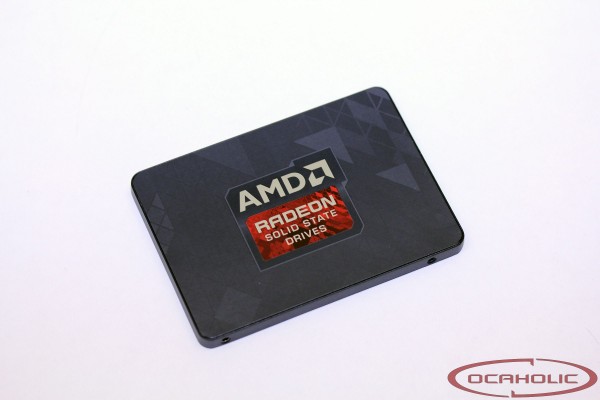AMD Radeon R7 Series SSD 240 GB Review
Published by Marc Büchel on 19.08.14Page:
 With the Radeon R7 SSD series AMD is launching their first solid state drive and at the same time OCZ has now a rather interesting customer at hand to grow their foundry business. Based on OCZs proven Barefoot 3 M00 controller and combined with Toshiba A19nm NAND flash AMD appears to be capable of offering a quick drive with very reasonable endurance rating. At this point we're curious to find out whether AMD succeeded with their plan or not.
With the Radeon R7 SSD series AMD is launching their first solid state drive and at the same time OCZ has now a rather interesting customer at hand to grow their foundry business. Based on OCZs proven Barefoot 3 M00 controller and combined with Toshiba A19nm NAND flash AMD appears to be capable of offering a quick drive with very reasonable endurance rating. At this point we're curious to find out whether AMD succeeded with their plan or not.
 Article in English Article in English |
 Artikel in Deutsch Artikel in Deutsch |
 Article en français Article en français |
 Articolo in Italiano Articolo in Italiano |
Specifications / Delivery
| Model | AMD Radeon R7 SSD 120 Gigabyte | AMD Radeon R7 SSD 240 Gigabyte | AMD Radeon R7 SSD 480 Gigabyte |
| Capacity | 120 GB | 240 GB | 480 GB |
| Form Factor | 2.5'', 7 mm | 2.5'', 7 mm | 2.5'', 7 mm |
| Memory |
|
|
|
| Endurance | 4 years @ 30 GB/day | 4 years @ 30 GB/day | 4 years @ 30 GB/day |
| Controller | Indilinx Barefoot 3 | Indilinx Barefoot 3 | Indilinx Barefoot 3 |
| Throughput |
|
|
|
| Accesstime (read) | < 0.1 ms | < 0.1 ms | < 0.1 ms |
| Acoustics | no noise | no noise | no noise |
| Warranty | 5 Years | 5 Years | 5 Years |
| Price |
xxx USD |
xxx USD |
xxx USD |
With the Radeon R7 SSD AMD as well as OCZ are going new ways. Looking at the situation from AMDs point of view, they’re making another step towards creating their Radeon based Gaming-PC, since meanwhile AMD offers CPUs, graphics cards, memory as well as SSDs. On the other hand there is OCZ taking quite a big step into the foundry business and with AMD they certainly managed to score an interesting customer.
Having a closer look at the Radeon R7 SSD shows there is a Barefoot 3 M00 controller, which can also be found in OCZs Vector 150 drive. Other than that there is Toshiba A19nm NAND, which OCZ is using with their Arc 100 SSDs. If you keep in mind, that the Vector 150 is OCZs flagship SATA SSD and the Arc 100 their entry-level offering, you might already realize how AMD is positioning the Radeon R7 Series SSD on the market. What they’re actually doing is creating a gaming category, which they put in between enthusiast and entry-level. This is also being reflected by the drives endurance rating. The Radeon R7 Series SSDs are rated for 30 Gigabyte of host writes per day over a time period of four years, which again puts it in between the Vector 150 and the Arc 100.
With their Radeon R7 Series SSDs, AMD is also to benefit from OCZs new Shield Plus warranty. In this case no proof of purchase is needed in order to qualify for support. Should a customer experience issues with a drive it's enough to mention the serial number when opening a support ticket. A customer service representative will then take over the case and find the most suitable solution. Should the drive be defective the customer will receive a pre-paid return label as well as a new drive.
| Navigate through the articles | |
 OCZ Arc 100 240 GB Review
OCZ Arc 100 240 GB Review |
Samsung 850 PRO SSD 256 Gigabyte Review
 |
|
|



